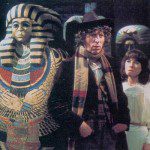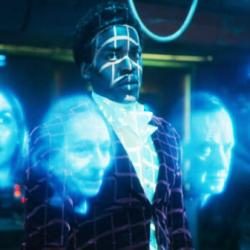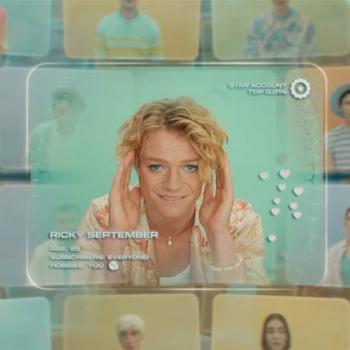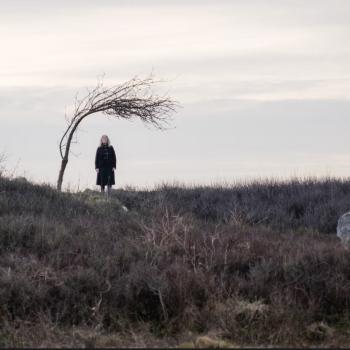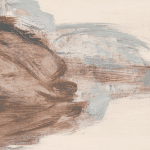In “Empire of Death” the Doctor and a host of others take on Sutekh. Yet before long there’s almost no one else left alive in the universe, just the Doctor, Ruby Sunday, and Mel. The obvious question is one that the Doctor poses to Sutekh. Why? Why is the Doctor allowed to continue living, along with these couple of others? The reason, we are told, is because Sutekh is even more curious than we are about the mystery of Ruby Sunday’s mother. When Ruby finds an answer and seems puzzled by it roughly halfway through the episode, asking “But what does it mean?” I thought for sure that there was something inherently puzzling in the identity of Ruby’s mother, that perhaps there was no match, or that Ruby herself was the match. Nothing adequately prepared me for what the show offered as the answer to this season-long question.
My own speculation as I was watching “Empire of Death” was that Susan Twist, brought into existence time and again by the TARDIS, would turn out in one iteration to be Ruby’s mother, so that in essence she was the daughter of the TARDIS, or perhaps (if the TARDIS used the Doctor’s DNA, not having any of its own), the Doctor’s daughter. I don’t mind having been proven wrong. The story that Doctor Who gave us was much more powerful, meaningful, insightful, and relevant.
Let’s back up. Hopefully you’ve watched the episode “Empire of Death” and know that, while sometimes we use the phrase “everyone dies” in this case that is literally the case on a universal scale. Kate Stewart, before she turns to dust, asks the Doctor to send this monster back into hell. She adds that she hopes that birds will sing again.
We learn that in the episode “Pyramids of Death” in which Sutekh first appeared Sutekh hid around the TARDIS and essentially clung to it, as a means of escaping the fate to which the Doctor tried to condemn him in the time corridor. Sutekh says that as a result he “evolved into his true godhood” and the TARDIS will be the temple of his “empire of death” (the title of this episode). Sutekh says that “Every living thing is an abomination” while the Doctor says to Sutekh, “I damn you in the name of life itself.”
For those of us who’ve watched Tales from the TARDIS and seen the intros to classic episodes featuring classic Doctors and characters in a TARDIS of memory, having that TARDIS feature in this episode was really cool. Time is memory and memory is time.
Connecting with the episode earlier this season by the same name, we learn that the perception filter of TARDIS extends 73 yards. The TARDIS created versions of Susan Triad everywhere. The Doctor says that “Strange things happen at 73 yards.” Although there are connections with the episode “73 Yards” Ruby never remembers that parallel timeline, although clearly the time window does.
The Doctor realizes that, in traveling with Sutekh as his unknown companion, he brought death to all those worlds. He says, “I thought it was fun” and then screams in anguish.
It was fun that in the glimpses of the episode “Pyramids of Mars,” when Ruby asks “What was all that Egyptian stuff?” the Doctor offers the casual reply, “Cultural appropriation.”
It turns out that Sutekh is frustrated because he cannot see Ruby’s mother. Not knowing something is intolerable to a deity. While the resolution of this narrative twist (he he) may not satisfy everyone, I’ll explain in a moment why I think it was more than fitting, indeed insightful and profound. But first, the notion that deities (not in the omniscient sense but in the sense of gods and angels as understood through most of history) might find aspects of human life and behavior inscrutable is a recurring motif throughout human religious literature down the ages. Doctor Who may perhaps help those of us who teach religion to convey what gods were thought to be like (as opposed to the God with a capital ‘G’ that is for many the dominant concept if not indeed the only one they are familiar with.)
Ruby asks herself, “If gods are scared of him then what am I?” Yet when they go to 2046, a time of mandatory DNA testing, to track down Ruby’s mother, the result puzzles her, and Ruby keeps asking, “But what does it mean?” It is such a poignant moment when Sutekh seizes control of Mel after a significant struggle to resist, and the Doctor says that he loved her. She asks, speaking from the perspective of Sutekh, “And what good did love do, Doctor? When did it ever help?”
When Sutekh insists that the information in the time window about Ruby’s mother be handed over, Ruby smashes it, calling him “You great big god of nothing.” We then learn that they realized Sutekh was working on trapping them, and they prepared to turn the tables on him. They drag him into the time vortex with the TARDIS – which in theory should not have been such a big deal, if Sutekh managed to hitchhike along with the TARDIS for such a long time. But presumably being in the vortex without a vehicle is not manageable even for this sort of powerful being.
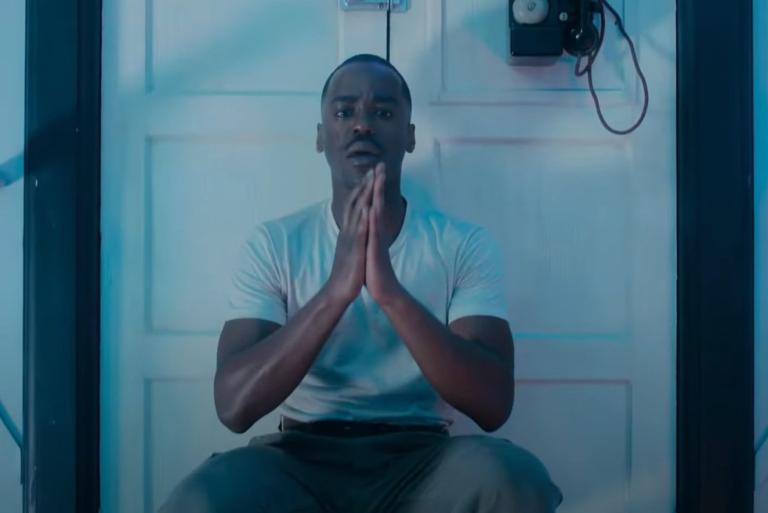 The Doctor asks, “What happens if you bring death to death? You bring life!” He says to Ruby, “We fought a monster. And now, I must become a monster.” The Doctor then says to Sutekh that he prides himself on being better than Sutekh, and therefore he tells Sutekh “you win, because you turned me into this. I am the one that brings death.” The Doctor then closes the TARDIS door, severing cable that held Sutekh and dragged him along, so that his existence is extinguished within the time vortex. Unless, of course, some future writer decides to bring him back.
The Doctor asks, “What happens if you bring death to death? You bring life!” He says to Ruby, “We fought a monster. And now, I must become a monster.” The Doctor then says to Sutekh that he prides himself on being better than Sutekh, and therefore he tells Sutekh “you win, because you turned me into this. I am the one that brings death.” The Doctor then closes the TARDIS door, severing cable that held Sutekh and dragged him along, so that his existence is extinguished within the time vortex. Unless, of course, some future writer decides to bring him back.
When we finally get the revelation about the identity of Ruby Sunday’s mother, it is that she is…ordinary. When Ruby struggles to understand how that can be true given the seemingly cosmic and universal significance that the identity of her mother had, the Doctor explains that that’s how wars and religions and love stories happen. We investing things and people with significance. For a moment, all of creation was turning around her. There is something more wonderful in that than if Ruby had turned out to be a literal miracle child or the child of some other character we’ve grown to love.
Although the Doctor advises against it, Ruby goes and talks to her mother in a coffee shop and the reunion is a joyful one. By the end of the episode, Ruby and the Doctor part ways. For perhaps the first time in the show’s history, the Doctor literally sheds tears over the departure. The Doctor really has changed, and as the Doctor says during the episode, Ruby played a key part in that transformation.
Earlier in the episode “Empire of Death,” the mysterious Mrs. Flood asks Ruby’s grandmother if she believes in the power of prayer. When she says that she most certainly does, Mrs. Flood says, “Then tell your maker, I will come to storm down his gates of gold and seize his kingdom by my true name.” It is a strange prayer to utter in any context but perhaps especially in response to Sutekh’s spreading “gift of death.” At the end of the episode, Mrs. Flood reappears to draw the story to a close and tell us that the Doctor’s story ends in “absolute terror,” only to then bid us adieu by saying, “Night night.” While not only the major season arc but lots of individual details reach a natural conclusion. Yet one major mystery, rather than being resolved, has become if anything even more tantalizing.
It seems as though it is all but certain that Mrs. Flood’s use of the phrase “clever boy” is a misdirection since there is no way that she can be Clara Oswald, is there? Of course, the “impossible girl” showed up in so many places that we’d expect that in one she might have a chance to live into old age. On the other hand, the connection of Ruby Sunday with Christmas day is intriguing, as it one of her outfits. Despite the water motif (pond and flood) there’s no way that she could be an older Amy Pond.
Her seeming nonchalance about telling us that the Doctor’s story ends in absolute terror makes her seem unlikely to be a former companion. Some have noticed her costume and suggested Romana but that seems a poor fit. Who would talk this way, and think that seeing a TARDIS is an unsurprising event? Perhaps another time lord, maybe even the Doctor’s mother? At the moment another of the gods (such as the White Guardian) seems the most likely answer, but I am sure we have not yet been given enough clues (and it is also likely that Russell T. Davies isn’t yet sure which way he will go with this either).
This was a fitting conclusion to the season’s arc and to the finale begun in “The Legend of Ruby Sunday.” What did you think about “Empire of Death”? Any speculation on the identity of the mysterious Mrs. Flood?









